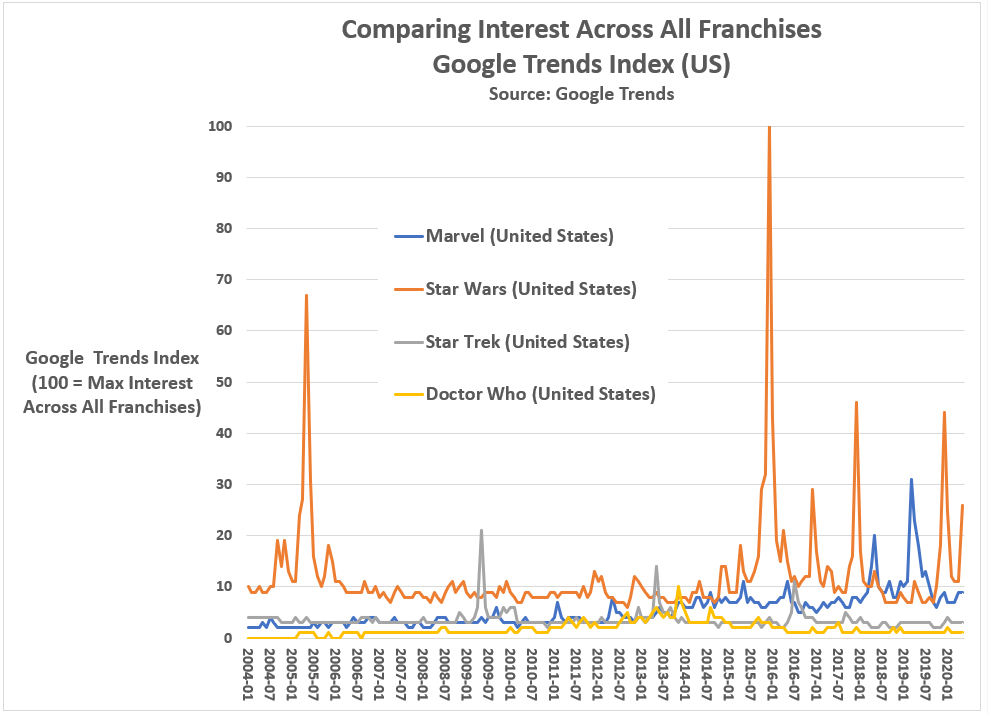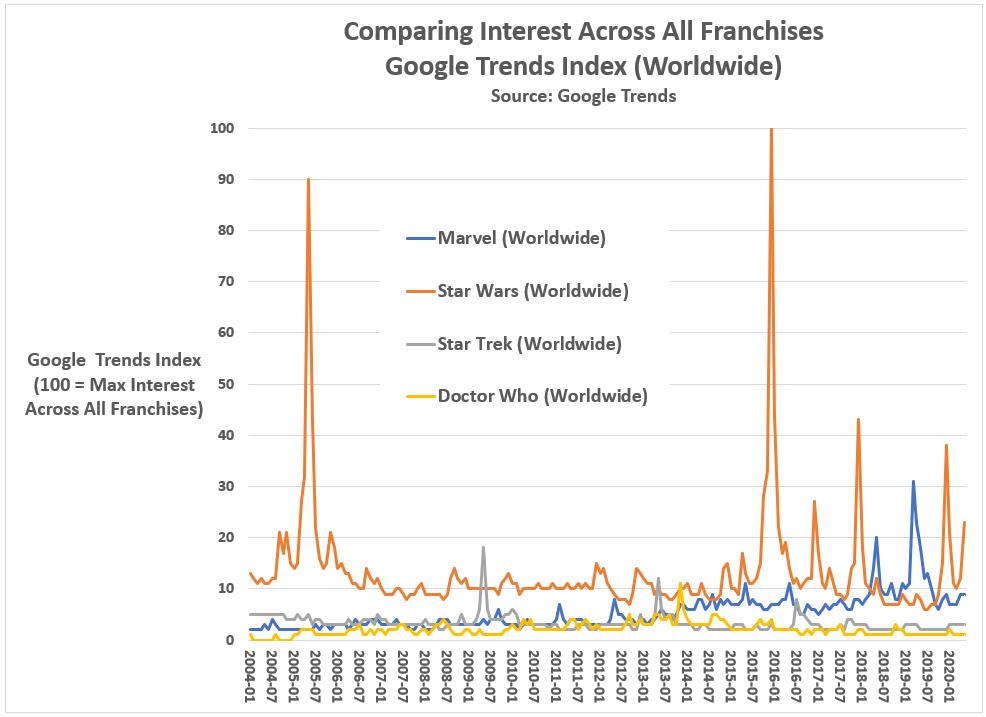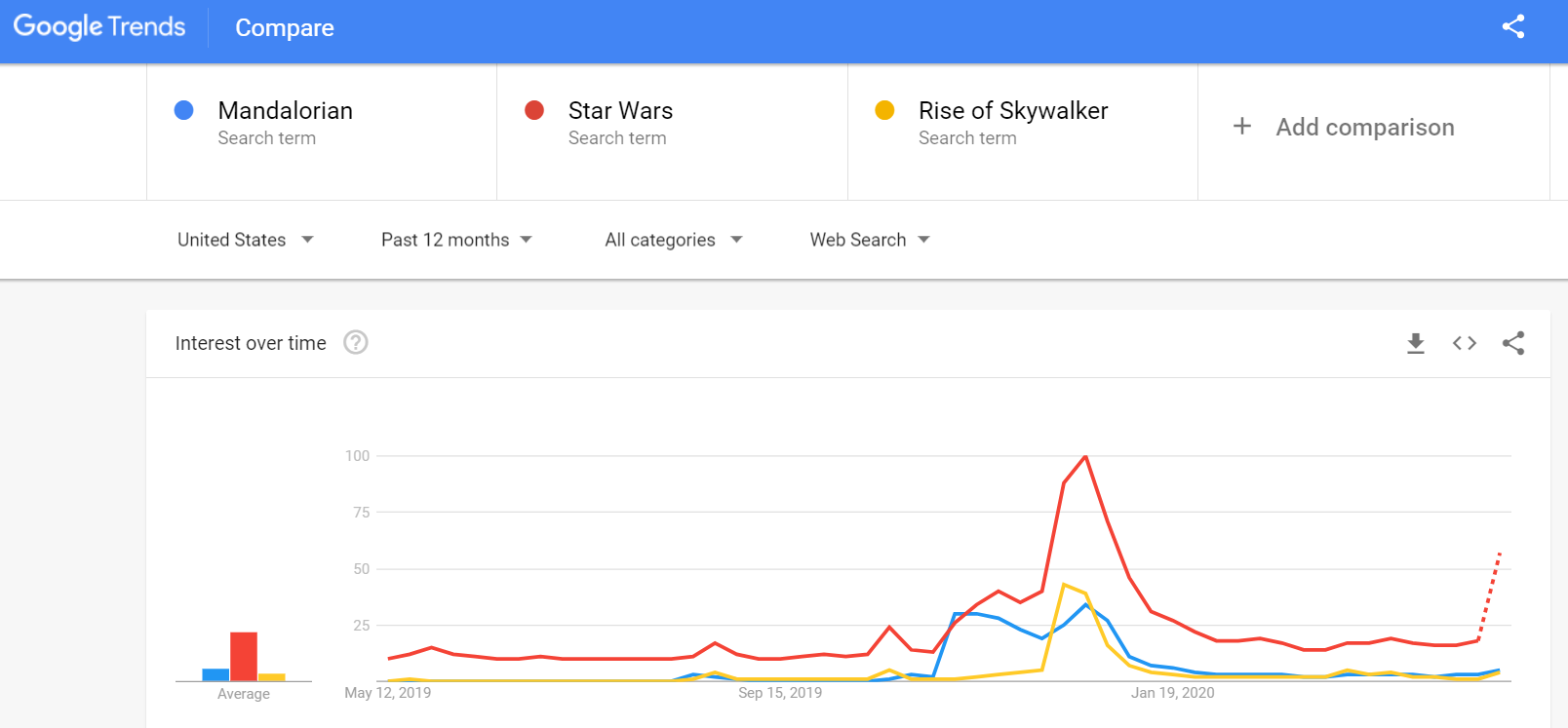By Kent R. Kroeger (Source: NuQum.com, May 10, 2020)
One of my first market research jobs was at HBO (New York) in the late-1990s. About two months into the job, a personal assistant to HBO CEO Jeff Bewkes asked me to attend a 4 p.m. executive meeting.
At the time, I was heading the subscription cable network’s yet-to-be-launched “HBO-on-Demand” service and had been verbally abused that morning by the network’s chief financial officer for inconsistencies in my 5-year budget proposal.
The CFO hated subtotals that didn’t add up as much as I hated making them.
As I assumed the 4 p.m. meeting with Mr. Bewkes was to fire me, my office neighbor reminded me that Mr. Bewkes would never lower himself to fire someone at my level.
Typically at HBO firings at my level would consist of a security guard informing you of your termination and then escorting you out of the building. To the extent you saw anyone else, it would be colleagues diving back into their offices as you walk your box full of desk toys and family pictures to the elevator.
After some encouragement from colleagues, my optimism started to rise, though the morning’s tongue-lashing from the network’s second most powerful person was still fresh in my mind.
I don’t remember much about Mr. Bewkes’ office except that it was large, had an dark lacquered desk, and a nice view of Manhattan’s Bryant Park.
I also remember the chair I sat in, as it put me about a foot below Mr. Bewkes eye line and every time I shifted my butt, the leather seat would make a sticky squeak sound. Since I tend to shift a lot (adult ADHD), the noise annoyed everyone in the room, including myself.
After a few small-talk niceties between myself and the three or four other people in the room, none of whom were the CFO (thank God), Mr. Bewkes turned to me to explain why I was there.
“Kent, I appreciate the work you are doing on our on-demand service. I just wanted to get the senior people together who will be working with you on getting it up and running.”
It was a nice introduction.
What Mr. Bewkes said next I have never forgotten.
“I am told you have a market research background and that is exactly the type of person we want launching this new service. For HBO-on-Demand to be successful — and this is true for any media service — you must know and respect your core audience.”
And I did know HBO’s core audience: Young, educated, upwardly mobile professionals.
“I’m HBO’s core audience,” I said.
Mr. Bewkes’ immediate smile sent a jet stream of adrenaline into my system. I was going to nail this meeting. God yes. Director of HBO-on-Demand today. CEO of Time-Warner-Europe by Arbor Day!
“Good. Good,” he shot back.
Good? How about great!? (I didn’t say that, of course.)
Mr. Bewkes leaned back in his chair and paused for a moment. “How long have you been an HBO subscriber?”
Uh oh.
The truth was, at the time, only twice in my life did I have HBO service. The first was as a teenager when I hacked into my neighborhood’s cable TV hub and pirated the service for about a year. The second time was Spring 1997 when I moved into a New Jersey apartment and the service had been paid for through the year by the previous tenant.
Yep. I could feel the swamp water rising above my ankles.
“Since I was a teenager,” was my answer followed by some butt shifting, with accompanying sticky squeaks. “With maybe a couple of service breaks here or there.”
Good lesson in life: When anyone uses the word ‘maybe,’ it often means they are about to throw up a verbal smoke screen.
I prayed Mr. Bewkes’ inquisition about my subscription habits was over.
It wasn’t.
“I believe that if you don’t love the product you sell, you’re in the wrong business,” he said.
That makes sense. Let’s talk about HBO-on-Demand now, I thought to myself.
Mr. Bewkes, still leaning back in his chair, drew wry smile across his lips and asked, “What’s your favorite HBO show?”
My confidence made one final appearance that day. I knew the best answer to his question. It was the show Mr. Bewkes’ launched during his tenure at HBO — the show that heralded the subscription service’s move away from carrying only theatrical movies to providing exclusive, HBO-produced content.
“The Sopranos, of course.”
The Sopranos made Jeff Bewkes one of the most coveted media executives in New York at the time.
It may have been the best answer, but it wasn’t a truthful answer. I had never watched a complete episode of The Sopranos in my life. It was another trendy East Coast show not targeted to people from Iowa who listen to Kansas and the Dave Matthews Band and consider dinner at The Olive Garden or Red Lobster a nice night out.
“Don’t worry, this is not a test.”
But, of course, that is what someone says right before they give you…a test.
Mr. Bewkes turned to the other executives in the room: “I like focus groups. They don’t give you hard numbers, but they give you insights you can only gain from listening to people and seeing their eyes; you get a better perspective.”
Oh, crap.
Mr. Bewkes turned his gaze back to me: “Any favorite Sopranos character?”
Double crap.
“Tony and Big Pussy,” came out of my mouth as if by divine intervention.
Phew! Nailed it again. But please God, let the questions end, I thought.
“A favorite episode?”
OK, I was cooked.
More butt squirming. More sticky squeaking.
“I can’t come up with one right at the moment,” Even more butt shifting. And more glances between Mr. Bewkes and the other executives — but no wry smiling this time.
I will always be grateful to Mr. Bewkes for not going for the kill shot. He knew I was feeding him bull crap. Another butt-kissing young executive. But he had the decency to leave me with at least some thin slice of dignity. Not a lot — an earlobe’s worth.
I worked at HBO for about two more months.
What is the point of this story? I had two takeaways: (1) Don’t feed people verbal crap, and (2) know and respect your core audience.
I don’t follow Lesson 1 very well, but Lesson 2 has been my market research mantra ever since — and particularly useful in political polling research.
Mr. Bewkes understood the basic tenet of marketing: Know your customer.
Indeed, experiences after HBO caused me to augment Mr. Bewkes’ original maxim to include this simple rule: If you want to alter your product so you can expand or change your customer base, give your current core audience a reason to follow. Many won’t, but the more that do, the more likely your product’s new direction will succeed.
This isn’t rocket science — it should be common sense, you would think.
A female-centric Star Wars TV series?
The loosely organized internet mob, self-labeled The Fandom Menace, came out in full force in this past two weeks over a news story that Lucasfilm, headed by Kathleen Kennedy, was going to executive produce a ‘female-centric’ Stars Wars TV series.
Joe Otterson, who broke the story for Variety, reported that Leslye Headland — co-creator of the Netflix series Russian Doll, recently renewed for a second season — will be the showrunner for a new Star Wars series on Disney Plus.
The exact plot of this new series is not known other than it will be female-centered and occur in a different time period than the other Disney Star Wars projects.
The Fandom Menace on YouTube and Twitter quickly ambushed Disney and Kennedy, none more ferociously than the YouTube vlogger Doomcock — future ruler of Earth:
“In light of Hollywood going bankrupt, Disney fighting for its life, and theater chains going under, I thought Hollywood was going to pull its head out of its ass and actually get back to just making entertainment that people want to see. Apparently not. Hollywood hasn’t learned a damn thing…
They (Disney) have picked the wrong person to do this show and I’m not saying that lightly. (Headland) is a social justice warrior typhoon five on the sphincter scale…
(Kathleen Kennedy), you’re gonna turn away from the lesson that the Mandalorian should have taught you — that, when you make even a mediocre series like the Mandalorian, fans will forgive you and watch — and now you’re going to develop an explicitly female-centric series for Disney Plus…
Kathleen Kennedy strikes again. (She) is ramming her agenda down the throats of fans and she’s recruited the social justice warrior equivalent of General Patton to run an entire armored division of woke right down our throats.
I thought Disney was fighting for its life, not trying to take its own life?”
Legions of other Star Wars fans on social media (Nerdrotic, ThatStarWarsGirl, Geeks + Gamers) have voiced similar complaints about this new Star Wars series.
In general, while puzzled why Disney needs another ‘female-centric’ Star Wars project — wasn’t that what the new Disney Star Wars trilogy was all about? — the Fandom’s complaints are more focused on why Kennedy continues to green-light new Star Wars projects despite being responsible for the Disney trilogy debacle.
The capstone to the Disney trilogy — The Rise of Skywalker — was a Frankenstein’s monster of a movie, stitched together so poorly even its director, J. J. Abrams had to confess the negative reviews had merit.
Visit the toy section in your local Target store. Disney Star Wars figurines and toys are sitting on the shelf: Untouched. Unloved. Unpurchased.
In a recent interview with Rebelscum.com, Chuck Terceira, President of Diamond Select Toys, a high-end collectibles manufacturer specializing in pop culture properties, said, “The overall demand for busts and Star Wars products is not what it was 10 or even 5 years ago.”
An interesting statement given that the start of the Disney Star Wars trilogy five years ago should have caused an explosion in demand for such collectibles.
There is an EF5-level storm in the science fiction franchise world right now. The most iconic franchises — Star Wars, Star Trek, Doctor Who — are genuinely at risk of being shelved.
Less iconic science fiction franchises have already met their end: The Terminator, Alien, The Transformers. [In the latter case, we are grateful.]
I don’t expect to see a new Superman movie in my lifetime.
With the exception of the Marvel Comics Universe (MCU) — which has the good problem of trying to match the success of its first phase movies which ended with the multi-billion dollar successes of Avengers: Infinity War and Avengers: Endgame — the other Sci-Fi franchises are struggling.
Why?
I don’t have the answer.
But I can show you the problem using worldwide Google search data obtained through Google Trends.
In the digital age, people can show interest in movie franchises in different ways. There are the traditional ways: go to a movie theater, buy a toy, watch a movie on TV. And there are new ways: Watch a movie on Netflix or some other premium service, download it from a file-sharing website, or stream it on your smartphone. And interest can also be shown simply by searching the internet for information about your favorite movie or franchise.
Google, of course, saves this information in the aggregate and offers it (for free) through Google Trends and other big data services they’ve developed (Google Ngrams is a personal favorite).
As for Google Trends, it has proven to be a valid and reliable data source for economic and social trend forecasters.
And it is the data service I recently used to plot public interest in the following Sci-Fi franchises since 2004: Star Wars, Star Trek, Doctor Who, and the Marvel Comics (which I include for comparison purposes).
The results are not good news. All three of these science fiction franchises — Star Wars, Star Trek, and Doctor Who — are dying from self-inflicted wounds.
But don’t take my word for it. Look at the Google Trends data on the search habits of people worldwide regarding these franchises.
It’s not a happy story.
Google Trends for Star Wars, Star Trek, and Doctor Who (as well as Marvel Comics)
Let us start by describing what a healthy movie franchise looks like based on Google search behaviors, and the best comparison is the Marvel Comics Universe (MCU).
Figure 1 shows worldwide Google search behavior since 2004 on the word ‘Marvel’ using the Google Trends Index which ranges from 0 to 100, where 100 equals the monthly maximum across the analytic time period (Jan 2004 to May 2020). For example, searches on ‘Marvel’ reached a 16-year maximum in April 2019, the month the movie Avengers: Endgame was released. The next highest month for searches on “Marvel” was April 2018, the month Avengers: Infinity War was released.
Figure 1: Google search interest in Marvel Comics (Worldwide, 2004 to present)
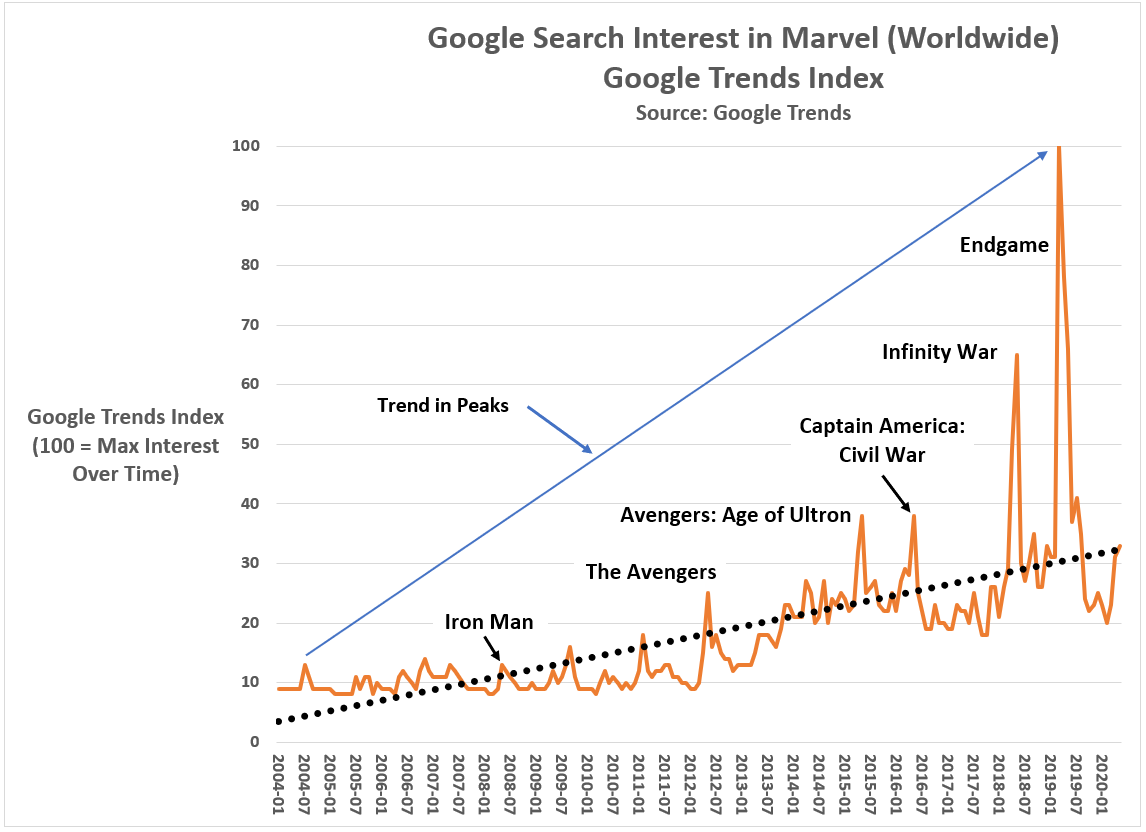
The key pattern in worldwide searches on “Marvel” is that they spike with each subsequent MCU movie release, starting with Iron Man in May 2008 through Avengers: Endgame. More importantly, and what distinguishes the MCU as a successful movie franchise, is that with each new MCU movie release, the level of “Marvel” searches increased over the previous movie release. The “peaks” in public interest for “Marvel” rise monotonically over time (i.e., never decreases).
In other words, Disney’s MCU franchise built fan interest and momentum over the course of MCU’s Phase 1 movie catalogue. That is what a successful movie franchise looks like; and while Figure 1 only tracks Google search behavior, this measure correlates strongly with the MCU movie worldwide box office receipts, as displayed in Figure 2.
Figure 2: Relationship between MCU Worldwide Box Office and Google Searches (Jan 2004 to May 2020)
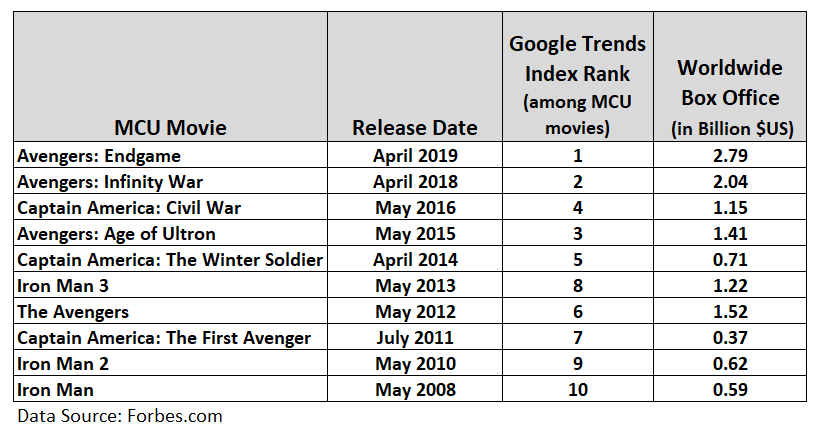
Just in the core MCU movies alone, the MCU has grossed over $12 billion $US, unadjusted for inflation) for Disney/Marvel. Adding in the other MCU origin story movies and their sequels (e.g., Black Panther, Thor, Thor: The Dark World), the MCU catalogue has grossed over $22 billion worldwide. Compare that to the Star Wars movies which have grossed a healthy, but not MCU-level, $10.3 billion worldwide. And Star Wars isn’t even number two all-time — that honor belongs to the 12 Harry Potter movies at $9.2 billion in worldwide movie receipts.
STAR WARS
The MCU is the gold standard for movie franchises, an honor formally belonging to George Lucas’ Star Wars franchise.
To someone like myself, who in June 1977 caught pneumonia standing overnight in line at the Strand Theater so I could be among the first of my friends to see Star Wars (now titled Star Wars: A New Hope), relinquishing the box office title to the MCU has not been easy. But, as The Killers song says, “This is the world we live in.”
Further distressing for Star Wars fans like myself has been the letdown of the Kennedy-produced Disney trilogy movies. There was so much hope among fans in December 2015 just before the release of Star Wars: The Force Awakens (helmed by J. J. Abrams).
The MCU was going to get some real competition from a new Star Wars saga (granted, both franchises are controlled by Disney, rendering a large element of the competition basically meaningless).
Figure 3 shows worldwide Google search interest for the term ‘Star Wars’ from 2004 to May 2020. The high point was December 2015 — which was a 9 percent increase over public interest during the month Star Wars: Revenge of the Sith was released (May 2005).
However, instead of generating interest in the Disney trilogy over time, Disney deflated it with The Force Awakens. Compared to the interest prior to The Force Awakens, interest in ‘Star Wars’ fell 76 percent leading into The Last Jedi and 86 percent prior to the release of The Rise of Skywalker.
Figure 3: Google search interest in Star Wars (Worldwide, 2004 to present)
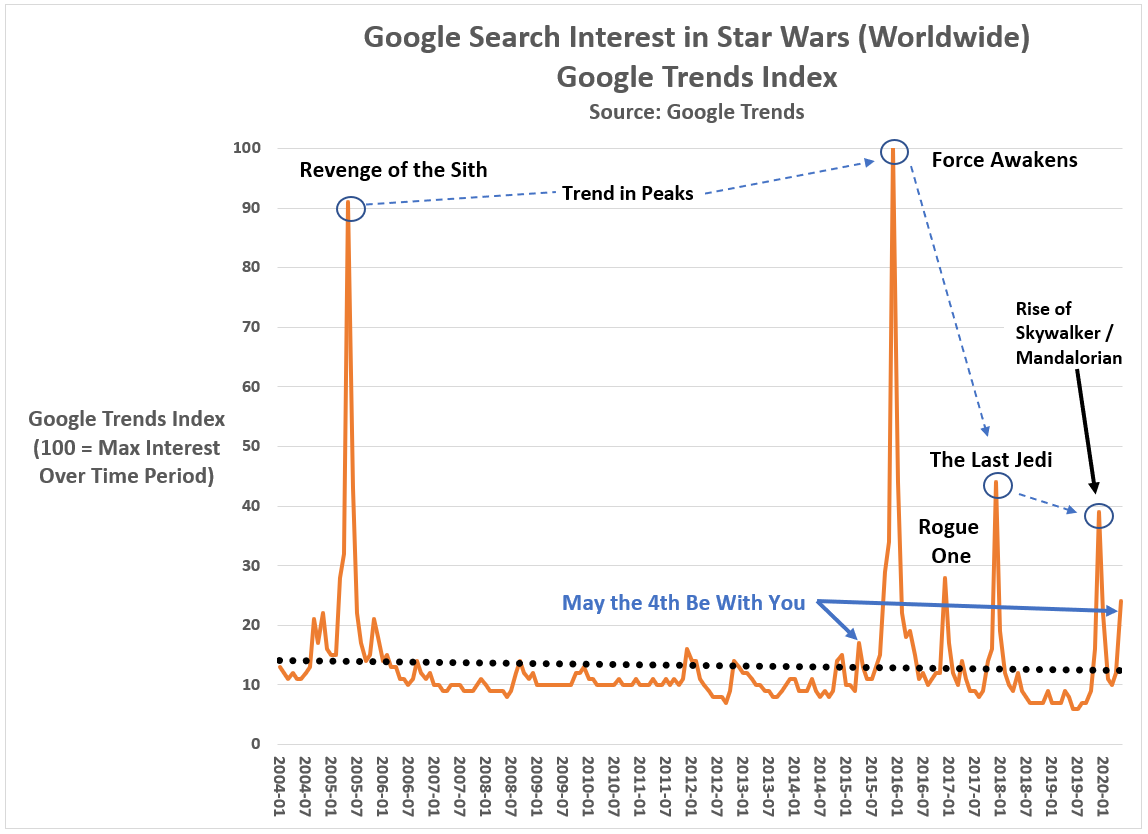
Wait, wasn’t it The Last Jedi that disappointed fans, not Force Awakens?
No.
The Google search data is uncompromising and clear: The Force Awakens killed public interest in Star Wars, not The Last Jedi. If The Last Jedi had been the culprit, the public interest spike in Star Wars leading into The Last Jedi would have been comparable to The Force Awakens. It was not even close.
Killing Han Solo as ignominiously as J. J. Abrams did and then marginalizing the Star Wars saga’s most important character — Luke Skywalker — was destined to anger Star Wars’ core audience. Why would Disney think otherwise?
Granted, Carrie Fisher’s death in December 2016 and the Last Jedi script leaks may have contributed to some softening in public interest in The Last Jedi, but those events are not comparable to the impact of a Star Wars movie itself.
The Force Awakens did the most damage to the Star Wars franchise.
As for the other two science fiction franchises I investigated in Google Trends — Star Trek and Doctor Who — they have witnessed similar declines in public interest.
In contrast to Star Wars and the MCU, I’ve limited my Google Trends analysis for Star Trek to the U.S and for Doctor Who to the U.K. as their fan bases have been mostly concentrated in the domestic markets of their origin.
We’ll start with Star Trek…
STAR TREK
Between 2004 and today, Google search interest in Star Trek peaked when the J. J. Abrams-helmed reboot of Star Trek debuted in May 2009 (see Figure 4). But, since the reboot, interest in Star Trek has been in a consistent decline — 38 percent lower for 2013’s Star Trek: Into Darkness and 63 percent lower for 2016’s Star Trek: Beyond.
Figure 4: Google search interest in Star Trek (US, 2004 to present)
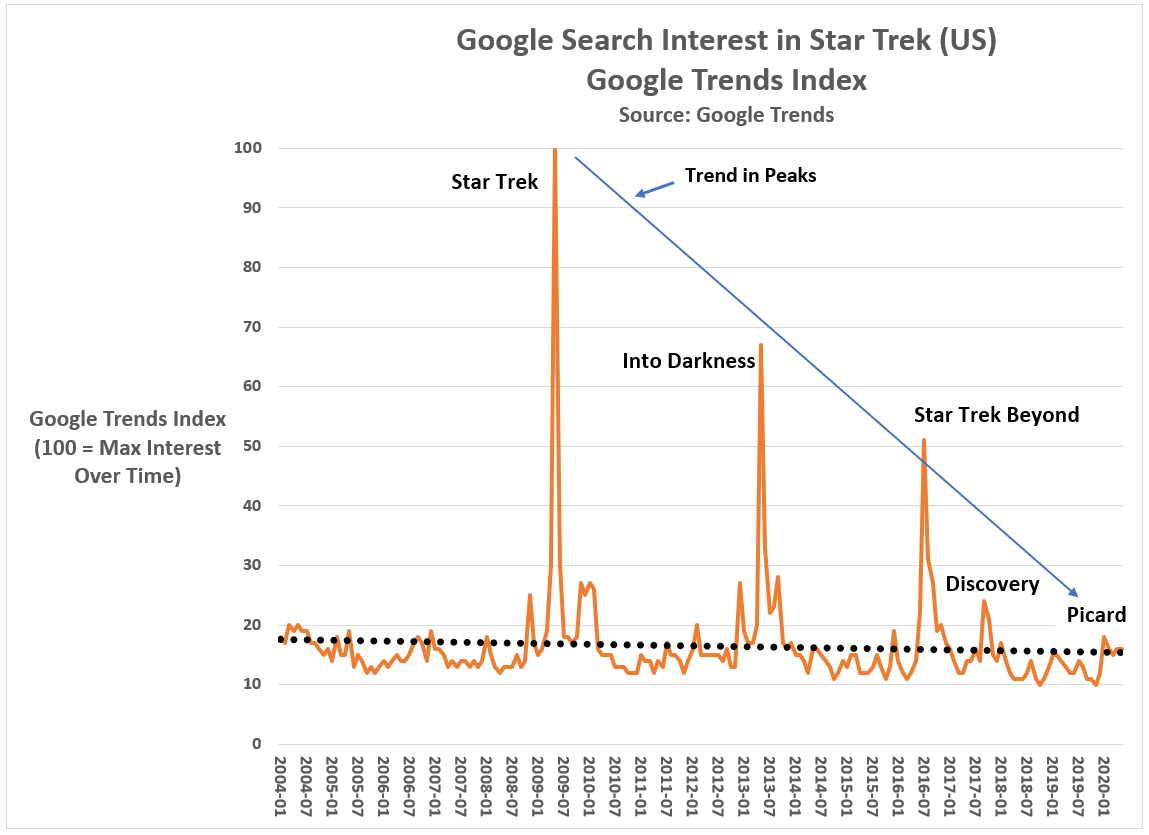
If you include the two CBS-produced Star Trek TV shows — Discovery and Picard — the downward “trend in peaks” for Star Trek has been steeper than for Star Wars, going from 100 on the Google Trends Index for the Star Trek reboot movie down to 19 for Picard.
Though the Google Trends data tells us little about why interest in Star Trek has declined, Star Trek fans on social media, especially those partial to the Prime timeline (i.e., The Original Series and The Next Generation) over the Kelvin timeline (started by J. J. Abrams’ Star Trek), are not reluctant to share their theories:


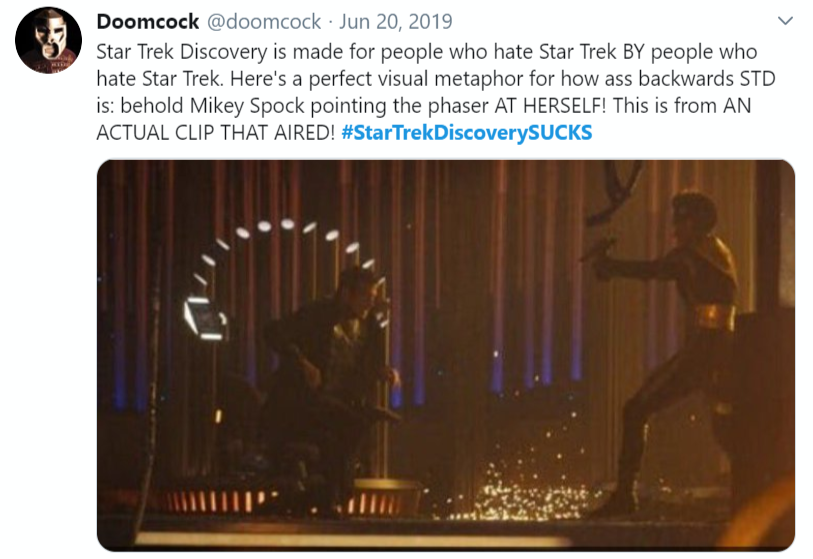

These complaints aren’t proof of anything but they capture the general sentiment I’ve seen and heard elsewhere across social media from the most vocal elements of the Star Trek fan base.
That overt sexist, racist and homophobic tirades are occasionally mixed in among otherwise cogent criticisms of the recent Star Trek projects should not detract from the more thoughtful Star Trek fans. It is an unfortunate feature of our social media ecosystem, but hardly the dominate one.
DOCTOR WHO
The last science fiction franchise I investigated was U.K.’s Doctor Who, a long-running TV series that ran from 1963 to 1989 in its first iteration, and then re-started in 2005.
For those unfamiliar, Doctor Who chronicles a time lord called “the Doctor” who travels through time in a space craft called the TARDIS — which looks like a blue British police box. One unique feature of the show is that the lead actor playing “the Doctor” changes whenever the time lord undergoes a “regeneration.” The result is that there have been 13 “Doctors” since the series started, 12 having been played by men, and the most recent being played by a woman, Jodi Whittaker.
Its hard to generalize every Doctor Who episode down to one sentence, but it might go something like this: “The Doctor,” a time lord, is accompanied by one or more human companions as they combat various alien foes in an effort to help people in need or to save past, present or future civilizations.
While I would characterize most Doctor Who shows as more lighthearted and cheeky than serious, some of the best episodes, particularly those when “the Doctor” says goodbye to a companion (or vice versa), can be profound and genuinely heart-breaking.
In other words, the show is very British: Smart. Sharply-written. Well-acted. And moves fluidly between humor and drama.
It is my favorite science fiction franchise. But I am fearful the show will not survive under its current writer (showrunner) Chris Chibnall.
We are fortunate that Google Trends goes back before 2005, the year of the Doctor Who reboot, so we can see the initial UK interest in the Doctor Who reboot (starring the underappreciated 9th Doctor Christopher Eccleston) through to the 13th Doctor (played by Whittaker).
Figure 5 reveals a number of interesting features of Doctor Who interest levels in the UK since 2004. First, interest in Doctor Who leading into the March 2005 reboot was relatively high (Google Trends Index =48) and grew with each new season’s final episode (i.e., “a rising trend in peaks”), climaxing in June 2008 with the Russell T. Davies-penned episode, “Journey’s End” — an episode marking final regular appearance of the Doctor’s very popular companion Donna Noble.
Figure 5: Google search interest in Doctor Who (UK, 2004 to present)
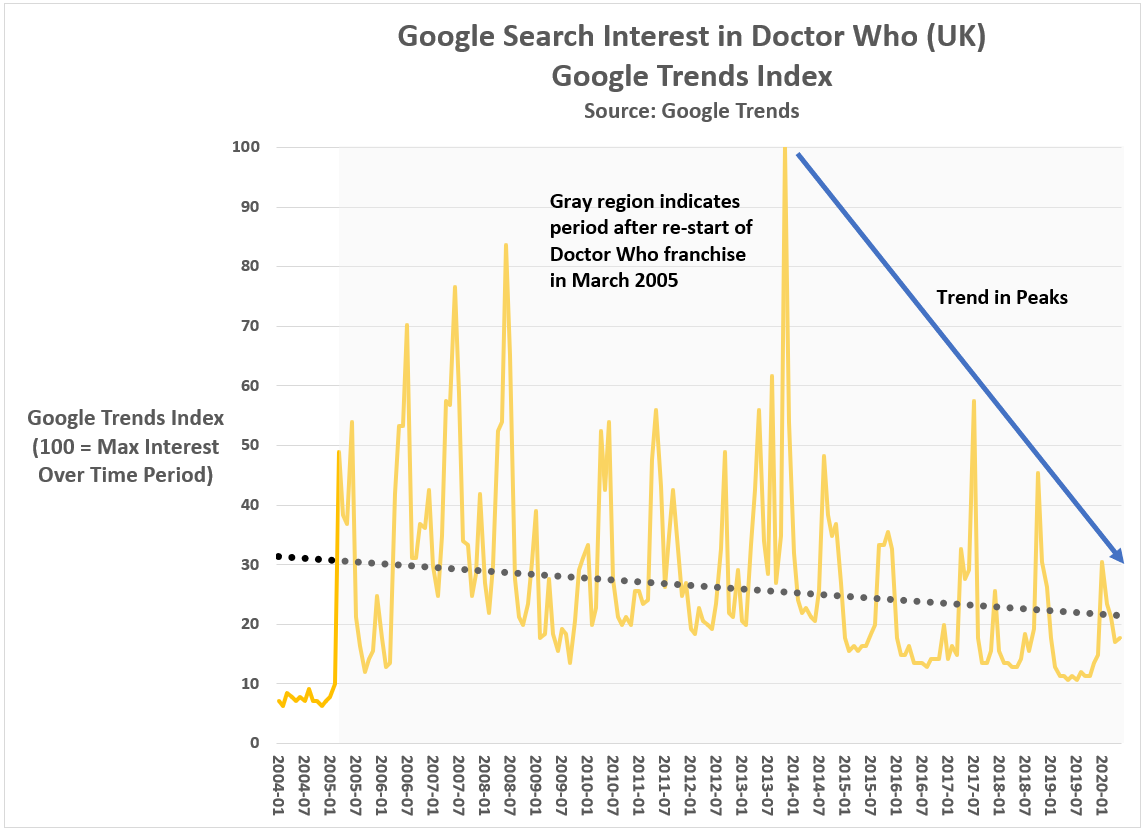
The revival of Doctor Who under Davies’ creative leadership is a textbook example of how to (re)build a science fiction franchise — superior writing, extremely likable actors, and respect for the long time Doctor Who fans who generated the initial excitement prior to the March 2005 reboot. “Know and respect your audience.”
That doesn’t mean a franchise can’t innovate and even violate previously established “canon,” as Davies did when the 10th Doctor short-circuited a regeneration process in order to create a clone of himself.
The problem for the Doctor Who franchise appears to have started following the transition from the 11th Doctor (played by Matt Smith) to the 12th Doctor (played by Peter Capaldi). During Matt Smith’s tenure as the Doctor, Google search interest peaked in November 2013 with the episode “The Day of the Doctor” in which David Tennant, reprising his role as the 10th Doctor, appeared along with the 11th Doctor.
In terms of public interest in the UK, the premiere of the first female “Doctor” (Whittaker) exceeded that of the March 2005 reboot, achieving a Google Trends Index score of 58. Unfortunately, its been downhill from there for Doctor Who and showrunner Chibnall. The last season ending special (December 2019) achieved a Google Trends Index score of 30, the lowest of any season ending Doctor Who episode.
What happened?
I think the best explanations of Doctor Who’s current death spiral comes from those defending the Chibnall-era shows:

I suspect “Steve” is not a Doctor Who fan. Prior to Chibnall, Doctor Who was not political, even as its core theme has always been the defense of the defenseless and dispossessed. That is not a “liberal” agenda, even if “liberals” think it is.
Pre-Chibnall Doctor Who avoided politics for the most part — and in the era of hyper-partisan, that doesn’t seem like a bad idea if you want to build a large audience. The MCU would not be as popular as it is had it decided to use its movie franchise to preach about border walls, privilege and the patriarchy. [Yes, I know Tony Stark, aka Iron Man, supported an Earth shield to protect us from hostile aliens and Captain America didn’t. That issue occupied maybe 10 minutes of a 22-movie franchise.]
The extent to which hot-button issues like racism or sexism were ever addressed on pre-Chibnall Doctor Who, it was done irregularly, and when addressed, done well. That is in stark contrast to the kitschy, two-dimensional way Chibnall handled the 13th Doctor’s Rosa Parks episode (“Rosa,” airing October 2018). If you want to see a superior time treatment of Rosa Parks’ historical significance by a science fiction show, watch the Quantum Leap episode “The Color of Truth — August 8, 1955.” [And I’m not a fan of Quantum Leap.]
‘Wokeness’ seems to inspire bad writing and I wonder why. Perhaps because, nowadays, it is too easy get such scripts approved or through the creative process without significant editing? I do not know.
All I know is that in the case of the three science fiction franchises I value the most — Star Wars, Star Trek, and Doctor Who — ‘wokeness’ is turning off their core audiences in droves. And, no, these franchise defectors are not all Donald Trump supporters.
Know and respect your audience
Jeff Bewkes didn’t invent the ‘know-your-audience’ principle. Its pretty rudimentary to any understanding of business marketing. But sometimes the easy lessons are the hardest to internalize and sustain. Our lives all tend towards complication, not simplicity.
And, in taking over the Star Wars franchise, Disney and Kathleen Kennedy committed the worst blunder of all: they alienated their core audience with a story line that was never going to attract a new audience. They killed Han Solo (who was a shell of his old-self) in the least heroic way possible — as a depressed, divorced dad. They took the franchise’s protagonist — Luke Skywalker, the courageous hero of the whole Lucas-inspired saga — and turned him into a feckless nag with not even the courage to help his sister Leia fight off the new looming menace, the First Order.
And they were going to make Leia, not Luke, the true hero of the Skywalker saga? When (God rest her soul) Carrie Fisher was is no condition to carry the Star Wars franchise in this new direction. Kathleen Kennedy and J. J. Abrams had to know that.
Disney seemed to be begging long time Star Wars fans not to show up for the new trilogy.
A friend recently described first generation Star Wars fans as “50- and 60-something divorced men who say ‘got’ a lot and still call flight attendants ‘stewardesses.’ Kennedy was never going to make a movie for them.
The trouble with that thinking is its inaccuracy. Star Wars fans, like science fiction fans, are misunderstood. They are mainstream entertainment consumers — a multi-billion dollar consumer segment split evenly between men and women and drawn from all age, income and racial/ethnic categories.
An entirely new generation of fans, whose first contact with Star Wars was the animated series Star Wars: The Clone Wars or the Lucas-produced prequel movies, now attend fan conventions in near equal numbers to the first generation fans.
In a 2014 survey of science fiction convention attendees, a subset of science fiction movie fans, the gender breakdown overall was 54 percent male to 46 percent female, but almost even for fans age 30 or under.
Science fiction is mainstream, which is why I understand Kathleen Kennedy and Leslye Headland’s belief that they can create a successful female-centric Star Wars series. There is a potential audience for such a show.
I just don’t believe Kennedy, Headland, or corporate Disney, based on how they butchered the Skywalker saga, have a bloody clue how to do it.
But I also believe Disney will find a way to revive their $4 billion dollar initial investment in Star Wars. Disney always finds a way. Disney marketing since Steamboat Willie has perfected the art of bludgeoning us to the point where we can’t get enough of Disney’s homogenized, entertainment caboodle.
Unfortunately, the other two Sci-Fi franchises — Star Trek and Doctor Who — are dead men walking.
They had great runs, but as George Harrison once sang, all things must pass.
My personal view on why these Sci-Fi franchises are teetering
My first science fiction loves were the British series Doctor Who (introduced to me when Tom Baker played the fourth doctor in the mid-70s and early-80s) and Star Trek (The Original Series).
If things look bleak for Star Wars (though I believe Star Wars will rise again, despite the mediocrity dominating the Disney output so far), the prospects for the Star Trek and Doctor Who franchises are even grimmer.
In both cases, TV ratings for their newest iterations are at or near historic lows, leading some long time fans to also point fingers at the showrunners and executive producers of these franchises for forcing their political agendas into show scripts, instead of good, solid science fiction stories.
In the case of Doctor Who, the thirteenth and latest doctor, Jodi Whittaker, is the first female doctor, which was largely met with positive reactions from fans. Not sitting well with many Doctor Who fans (including myself), however, is the writing that has dominated Chris Chibnall’s two-year tenure as the showrunner (and he’s slated to return for a third). Where once Doctor Who episodes emphasized the science in science fiction (often dealing with time travel), the Chibnall produced shows descend into didactic, high school civics class-level moralizing.
Star Trek has suffered a similar fate under the leadership of CBS TV Studio’s Alex Kurtzman. Where Star Trek creator Gene Roddenberry evoked an optimistic, inclusive image of our future, the newest Star Trek properties paint a bleak future. If the Road Warrior and Logan had a baby, it would be Star Trek: Picard. [That isn’t a fair characterization. Road Warrior and Logan are two of my favorite dystopian-genre movies of all time. Those are great movies. Picard is not a great TV show — just a dispiriting one.]
And then there is the colossus of science fiction movie franchises — Star Wars.
George Lucas changed fundamentally what movies are made and how they are made. Hence, the franchise’s possible demise may do the same.
When a movie like The Rise of Skywalker can cost up to $300 million to make and still be considered a “failure” after grossing over $1.3 billion worldwide, you know there is a structural problem in Hollywood.
I also believe that computer-generated-imagery (CGI) has hurt science fiction movie making as much as helped. I think that’s why I’ve always drifted towards TV shows like Star Trek (The Original Series) and Doctor Who. They are story and character-driven, not special effect-driven.
I suppose its my age that causes this feeling, but I’ve seen my son and his teenage friends watch these movies and, more often than not, they look bored.
Do you know what they like? They like funny characters and funny dialogue. They good writing reinforced by good acting and editing.
I thought Guardians of the Galaxy Vol. 2 had some of the most amazing CGI I have ever seen. The movie’s nemesis, Ego, played by Kurt Russell, lives on a planet that in the IMAX format literally took my breath away.
To my son and his friends, those amazing graphics in Guardians were white noise. When I ask them what they thought of the CGI and special effects, I get answers like: “They were OK.” “Good.” “Cool.” “The Last Jedi was better.”
When they talk among themselves about movies like Guardians, they talk about the characters. The funny lines. Even the CGI-heavy battle scenes are remembered, not by the explosions, but through references to characters’ one-liners (such as Guardians’ Yondu: “I’m Mary Poppins y’all!”)
They crack up laughing every time Drax calls Mantis ugly (if you are not familiar with Guardians, Mantis happens to be very attractive).
Fun dialogue. Good actors. Decent storytelling. Swift pacing. Those are the core elements that form the secret sauce for building lasting science fiction franchises. Star Wars had it. Star Trek had it. And Doctor Who had it.
Have you watched any of those franchises recently?
Here is my one-minute summary: Women are, by nature, good (see the Disney Star Wars trilogy). Some men are good, but stupid (see Solo, Picard or any Doctor Who episode from the 13th doctor’s first season). The other men are bad and also stupid (see any Doctor Who episode from the 13th doctor’s second season). Bad women are bad because of bad men (see Birds of Prey). And everyone is sexist, racist and privileged…except women (watch any hour of MSNBC).
That is why these franchises are dying. Even women don’t want to watch that patronizing crap. People are numbed by the incessant preaching and scolding that defines the most recent Doctor Who episodes. They are depressed by the dystopian future offered by shows like Star Trek: Discovery and Star Trek: Picard.
Science fiction movies used to be fun. And even when they were serious or scary (e.g., Aliens), they were still fun.
Not any more.
If Disney wants a successful female-centric science fiction franchise, they should create a new one. Star Trek creator Gene Roddenberry didn’t want to make The New Adventures of Buck Rogers for a reason: Buck Rogers wasn’t his idea. Instead, he created a new franchise — Star Trek — and changed science fiction entertainment forever. George Lucas and Star Wars even more so. And no science fiction franchise will be as smart as Doctor Who. All three are original ideas created by creative people.
But if the data I’ve presented here are telling, these franchises are done.
I will miss them.
- K.R.K.
Requests for data used in this article can be sent to: kroeger98@yahoo.com
Final note: I apologize for not answering all constructive comments and requests sent to me. There are just too many, but I will continue to try.
APPENDIX: Other Google Trend Graphs
